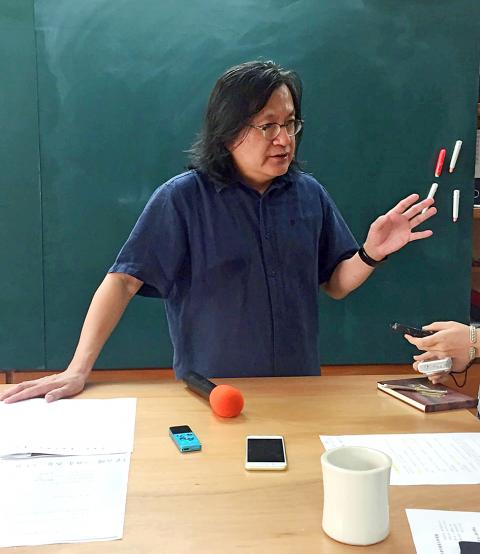The Taipei City Government yesterday said it had reported Farglory Group (遠雄集團) and two architects overseeing the construction of the Taipei Dome to its disciplinary committees, and that it had upheld a punishment imposed on Farglory in May to halt the construction of the arena after the city government’s appeal review committee last month rejected an appeal by the group.
Taipei Department of Urban Development Commissioner Lin Jou-min (林洲民) made the announcements prior to a protest by a group of employees of companies involved in the Dome’s construction, who said the city government’s ordering the project to be halted infringed on their right to work.
Citing Article 18 of the Architects Act (建築師法), Lin said that the department had reported the architect overseeing the construction, Stan Lo (羅興華), and his predecessor, Hsu Shao-yu (徐少游), to the city’s Disciplinary Committee for Architects over professional negligence in overseeing the construction.

Photo: CNA
Meanwhile, Farglory and project co-contractor Obayashi Corp had been reported to the city’s Construction Enterprise Review Committee over their failure to carry out work according to the construction plan, alleged breaches of Article 26 and Article 35 of the Construction Industry Act (營造業法), Lin said.
Lin said the two architects could face punishments ranging from a warning, demerits or having their licence suspended for between two months and two years, to their licenses being revoked or invalidated.
Possible punishments that the construction companies and their specialists face include a warning and a suspension of their operations for between three months and one year, he said.
However, depending on the committees’ conclusions, the individuals and firms might not be punished, he added.
He said that although previous structural concerns surrounding the Dome, including the stability of its foundations and a purported “upward buoyancy force” caused by the suspended construction are under control, the project must meet four requirements before construction can be resumed.
First and foremost, it must pass a review administered by the Taiwan Architecture and Building Center, which would assess whether the project complies with a set of provisions, Lin said.
Then, it would have to pass an environmental impact assessment, an urban design review and, finally, a review of its construction licenses, he added.
Asked to comment on the protesters, Lin said that while the Taipei City Government is concerned about them, agreements between their companies and Farglory was not a matter the city government can intervene in.
Meanwhile, Taipei Mayor Ko Wen-je (柯文哲) called on Farglory to take a proactive stance on resolving public safety issues concerning the Taipei Dome, rather than threatening to file lawsuits.
Ko said that compared with safety concerns, he is less worried about the nominal royalties to be paid by Farglory should the Dome become operational, adding: “What good does money do if people are dead?”
Under a contract inked between then-Taipei mayor Ma Ying-jeou (馬英九) and Farglory, royalty payments required from the firm were set at zero to 1 percent of the arena’s annual revenues, which sparked controversy over Ma’s administration improperly benefiting the corporation, which was selected by the city government in 2004 to undertake the build-operate-transfer project.

AGING: As of last month, people aged 65 or older accounted for 20.06 percent of the total population and the number of couples who got married fell by 18,685 from 2024 Taiwan has surpassed South Korea as the country least willing to have children, with an annual crude birthrate of 4.62 per 1,000 people, Ministry of the Interior data showed yesterday. The nation was previously ranked the second-lowest country in terms of total fertility rate, or the average number of children a woman has in her lifetime. However, South Korea’s fertility rate began to recover from 2023, with total fertility rate rising from 0.72 and estimated to reach 0.82 to 0.85 by last year, and the crude birthrate projected at 6.7 per 1,000 people. Japan’s crude birthrate was projected to fall below six,

Conflict with Taiwan could leave China with “massive economic disruption, catastrophic military losses, significant social unrest, and devastating sanctions,” a US think tank said in a report released on Monday. The German Marshall Fund released a report titled If China Attacks Taiwan: The Consequences for China of “Minor Conflict” and “Major War” Scenarios. The report details the “massive” economic, military, social and international costs to China in the event of a minor conflict or major war with Taiwan, estimating that the Chinese People’s Liberation Army (PLA) could sustain losses of more than half of its active-duty ground forces, including 100,000 troops. Understanding Chinese

US President Donald Trump in an interview with the New York Times published on Thursday said that “it’s up to” Chinese President Xi Jinping (習近平) what China does on Taiwan, but that he would be “very unhappy” with a change in the “status quo.” “He [Xi] considers it to be a part of China, and that’s up to him what he’s going to be doing, but I’ve expressed to him that I would be very unhappy if he did that, and I don’t think he’ll do that. I hope he doesn’t do that,” Trump said. Trump made the comments in the context

SELF-DEFENSE: Tokyo has accelerated its spending goal and its defense minister said the nation needs to discuss whether it should develop nuclear-powered submarines China is ramping up objections to what it sees as Japan’s desire to acquire nuclear weapons, despite Tokyo’s longstanding renunciation of such arms, deepening another fissure in the two neighbors’ increasingly tense ties. In what appears to be a concerted effort, China’s foreign and defense ministries issued statements on Thursday condemning alleged remilitarism efforts by Tokyo. The remarks came as two of the country’s top think tanks jointly issued a 29-page report framing actions by “right-wing forces” in Japan as posing a “serious threat” to world peace. While that report did not define “right-wing forces,” the Chinese Ministry of Foreign Affairs was